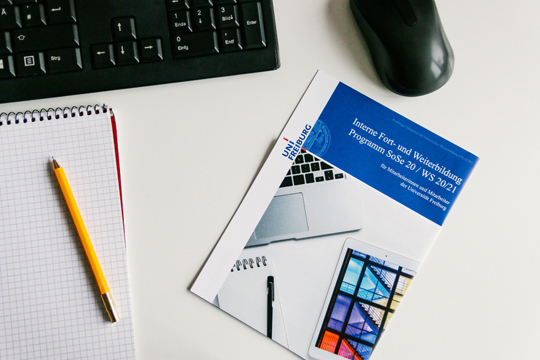“Leisure time is never urgent, but always important”
Freiburg, Mar 10, 2020
Some days begin in the office even before you have time to take off your coat. The phone is already ringing, your e-mail inbox is bursting at the seams with unread messages and the first of three appointments is going to start any minute now. It is often not easy to remain calm in the face of such a workload. Stress and hectic activity affect most employees at the University of Freiburg, whether they work in administration, research, technology or housekeeping. For this reason, the Internal Further Training and Continuing Education Program (IWB) supports employees with new and proven seminars on the topics of stress and time management. Interested parties can now register online for these and other courses on offer in the 2020 summer semester.
 Everyday stress? Good time management skills can help. Photo: leonidkos/stock.adobe.com
Everyday stress? Good time management skills can help. Photo: leonidkos/stock.adobe.com
High blood pressure, back pain from tense muscles or loss of appetite are all signs that a person is overworked and under stress. “The flow of information is much faster today than it used to be because of technical means of communication,” says business psychologist Karina Blömeling, who gives seminars on effective time management and the successful design of meetings as part of the IWB program.
Check e-Mail at specific times
Today, information comes through e-mails and other media channels virtually every minute. "It can happen that technical performance is equated with human performance, which creates a feeling of work overload," explains Blömeling. It is therefore important to be aware of this and to take preventive action against it. Time management is all about getting the right tasks done at the right time.
One tip is to restructure the workload such as checking e-Mail at specific times throughout the day. “This takes the pressure off having to answer everything immediately,” advises the business psychologist, adding: “It is not only the time it takes to read the messages, but also the fact that you are mentally removed from your actual work.”
During meetings, it is also a good idea to consider carefully whether they are really necessary. Fewer meetings can be more effective, as many things can often be clarified with less work, for example, by e-mail, telephone call or a face-to-face meeting. “Holding meetings too often is perceived as time-consuming, which has a demotivating effect and can lead to a decline in job satisfaction and willingness to perform,” emphasizes Blömeling.
 The IWB has compiled an overview of all offers in this flyer. Registration for the summer semester 2020 is now open. Photo: Sandra Meyndt
The IWB has compiled an overview of all offers in this flyer. Registration for the summer semester 2020 is now open. Photo: Sandra Meyndt
Stress management is preventative
“Basically, new or unfamiliar situations are often experienced as stressful," said psychologist Dr. Tobias Stächele from the University of Freiburg. He is head of the Outpatient Psychotherapy Clinic for Stress-Related Disorders and advises IWB employees who feel that their workload is too high. The short-term reaction to stress is actually good, he says, because it gives the body additional energy. “The problem is when the condition becomes chronic and you are constantly under stress,” he emphasizes.
As an employer, the University offers many opportunities for change. This has advantages, but can also trigger stress at all levels: Doctoral students are worried about fixed-term contracts, administrative offices rotate due to new processes and increasing digitalization, and managers have to deal with a multitude of different tasks. “The services offered by the IWB are therefore very important and help to prevent stress-related illnesses,” Stächele emphasizes.
Before his seminars, the Freiburg psychologist uses a questionnaire to ask participants for information on their current stress and work status. “I would like to know in advance who is sitting there and what their motivation is,” he says. Because there are those who are affected themselves and then there are those who are worried about their colleagues.
Many people have tried, at the expense of their own recovery, to do their best and tend to make the working day more and more intense. “Instead of actively recovering in the evening from what happened during the day, people often watch too much television or drink too much alcohol. Then it’s not the stress, but rather how we deal with the things that make us ill,” explains Stächele. In principle, there are three approaches that help to deal with an excessive workload: building up more resources such as time or social networks, strengthening individual coping strategies such as optimism or taking regular breaks and buffer times or, if you are already stressed, knowing how to relax in a targeted manner. “This could be a visit to the sauna, sports or a massage,” he says, adding: “Time for leisure is never urgent, but always important.”
Registration is now open
The seminars on time and stress management are very important, but represent only one aspect of the program, explains IWB Director Ruth Meßmer: "We have designed a high-quality program for our various target groups, which also takes into account other comprehensive topics such as internationalization and digitization." The overview can be found on the IWB homepage and on the current flyer. Registrations for the summer semester 2020 can be accepted by the team of the internal further education.
Registration (in German)
Judith Burggrabe

